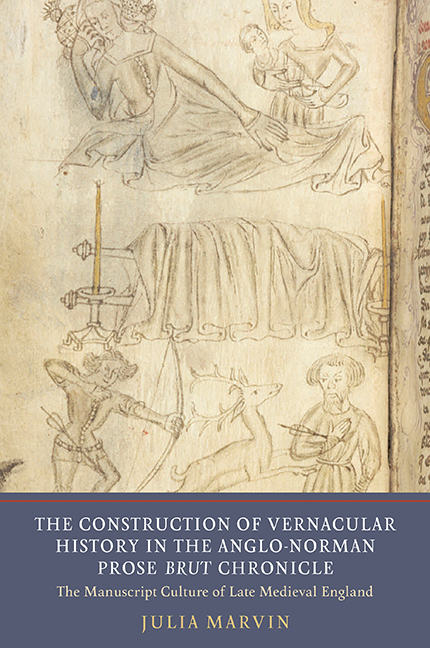 The Construction of Vernacular History in the Anglo-Norman Prose Brut Chronicle
The Construction of Vernacular History in the Anglo-Norman Prose Brut Chronicle Book contents
- Frontmatter
- Dedication
- Content
- List of Plates
- Acknowledgments
- Abbreviations
- A Note on Proper Names, Transcriptions, and Translations
- Introduction: Recognizing the Prose Brut Tradition
- Part I Construction
- Part II Reconstruction and Response
- 6 Evidence of Production
- 7 The Company That Prose Bruts Keep
- 8 Ordinatio, Apparatus, and Annotation
- 9 History Illustrated
- Conclusion: Merlin's Power
- Bibliography
- General Index
- Index of Manuscripts Cited
7 - The Company That Prose Bruts Keep
from Part II - Reconstruction and Response
Published online by Cambridge University Press: 01 February 2018
- Frontmatter
- Dedication
- Content
- List of Plates
- Acknowledgments
- Abbreviations
- A Note on Proper Names, Transcriptions, and Translations
- Introduction: Recognizing the Prose Brut Tradition
- Part I Construction
- Part II Reconstruction and Response
- 6 Evidence of Production
- 7 The Company That Prose Bruts Keep
- 8 Ordinatio, Apparatus, and Annotation
- 9 History Illustrated
- Conclusion: Merlin's Power
- Bibliography
- General Index
- Index of Manuscripts Cited
Summary
The Anglo-Norman prose Brut is a substantial but not enormous work, long enough to be the only work in a codex, but not so long that it demands to be the only work in a codex, nor so dauntingly long that it may repel copying at all, as Mannyng's massive Story of England may have done. It is also highly supplementable, easy to expand with supporting material or material broadening its range of subject matter and time. Just such additions at beginning and end with material that proved durable gave rise to what are now considered the Short and Long Versions of the Anglo-Norman prose Brut. The process of expansion through continuation went on into the fifteenth century with the Middle English versions. The Latin genealogical charts and poems found at the beginning of RD329 and the brief Anglocentric chronicle of Scottish affairs found at its end represent another variety of expansion, with complementary material that might aid in the reading of the main text or flesh out areas given less attention in it.
In roughly 40 percent of its manuscripts, the Anglo-Norman prose Brut is the only work in the codex as it currently stands. These manuscripts tend to make for portable and not terribly expensive books, and it is easy to imagine these qualities as attractive to the people paying for them. They certainly seem to confirm Connolly's view that ‘the market for English books may have been moving towards the production of single texts before printing’. Of these manuscripts, however, not a single one is in an original or even early binding, and just over half are fragmentary or imperfect at beginning and/or end. Only a few are in volumes that begin and end so tidily as to give one every reason to think that they are complete and intact. With the manuscripts that begin or end incomplete, although it may be possible to estimate the amount of material missing from the prose Brut itself, there is generally no indication – like contemporary page numbers or quire markings – of what else might be missing. It would be rash to presume that all of them always contained only a prose Brut.
- Type
- Chapter
- Information
- The Construction of Vernacular History in the Anglo-Norman Prose Brut ChronicleThe Manuscript Culture of Late Medieval England, pp. 163 - 176Publisher: Boydell & BrewerPrint publication year: 2017


